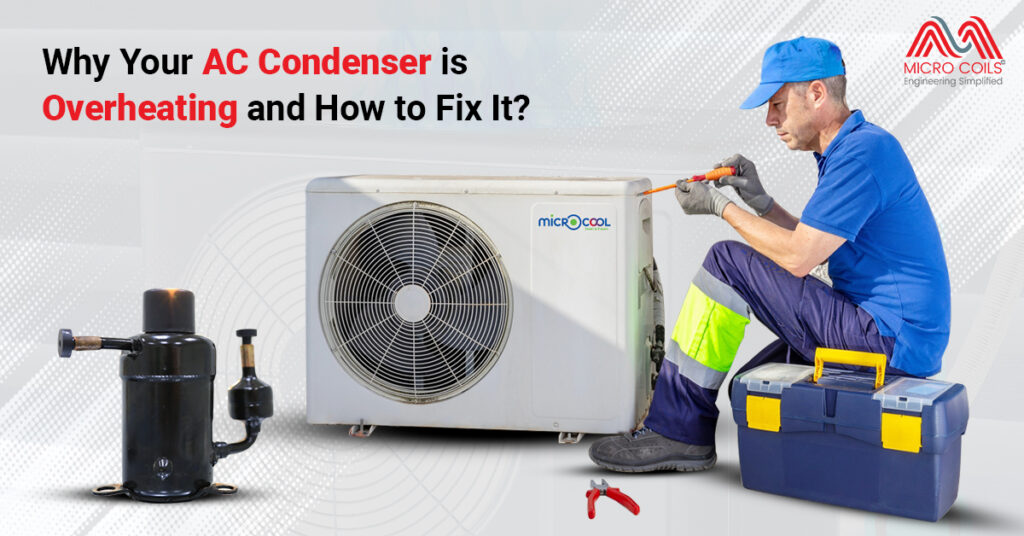
What Is an AC Condenser and Why Does It Matter?
Your air conditioning system has several key parts working together to cool your home. The condenser is the outdoor unit that sits outside your house, usually on a concrete pad or mounted on brackets. This component plays a crucial role in removing heat from your home and releasing it outside. Inside the condenser, you’ll find the AC condenser coil, often referred to as the ac condenser copper coil, which is a series of copper tubes surrounded by aluminum fins.. This coil works with refrigerant to transfer heat from inside your home to the outside air. When the condenser overheats, this heat transfer process becomes inefficient, making your entire system work harder than it should.Common Signs Your Condenser Is Overheating
Before we discuss solutions, it’s important to recognize the warning signs of an overheating condenser:- Your air conditioner runs constantly but doesn’t cool your home effectively
- Unusual noises coming from the outdoor unit
- Higher than normal electricity bills
- Ice formation on the AC cooling coil or refrigerant lines
- The outdoor unit feels extremely hot to the touch
- Frequent system shutdowns or cycling on and off repeatedly
Top Reasons Why AC Condensers Overheat
Dirty or Clogged Condenser Coils
The most common cause of condenser overheating is dirty coils. Over time, dirt, leaves, grass clippings, and other debris accumulate on the condenser coils. This buildup acts like a blanket, preventing proper heat transfer and forcing your system to work overtime. When the AC condenser coil can’t release heat effectively, the refrigerant temperature rises, causing the entire system to overheat. This problem gets worse during peak summer months when your AC works hardest.Poor Airflow Around the Unit
Your condenser needs plenty of space to breathe. Many homeowners make the mistake of planting shrubs too close to their outdoor unit or storing items nearby. This restricts airflow and traps hot air around the condenser, leading to overheating.Refrigerant Issues
Low refrigerant levels or refrigerant leaks can cause your condenser to overheat. When there’s not enough refrigerant in the system, the remaining refrigerant has to work harder to absorb and release heat, causing temperatures to rise dangerously.Electrical Problems
Faulty wiring, a failing fan motor, or a damaged running capacitor for air conditioner can prevent your condenser from operating properly. When the fan motor doesn’t work correctly, hot air gets trapped around the coils, causing overheating.Age and Wear
Older systems naturally become less efficient over time. Components wear out, seals deteriorate, and the overall performance declines. An aging condenser may struggle to handle normal cooling demands, especially during extreme weather.How to Fix an Overheating AC Condenser?
Clean the Condenser Coils Regularly
The easiest fix for many overheating problems is regular coil cleaning. Turn off power to your unit and gently spray the coils with a garden hose, working from the inside out. For stubborn dirt, use a soft brush or specialized coil cleaner. This simple maintenance task can dramatically improve your system’s efficiency. Remember to be gentle with the AC cooling coil fins, as they bend easily and can reduce airflow if damaged.Improve Airflow Around Your Unit
Create a clear zone around your condenser by removing any obstacles within three feet of the unit. Trim back vegetation, move stored items, and ensure nothing blocks the top of the unit. This allows hot air to escape properly and cool air to circulate freely.Check and Replace Air Filters
Dirty indoor air filters can cause your entire system to work harder, including the condenser. Replace your filters monthly during peak usage periods and check them regularly throughout the year.Schedule Professional Maintenance
Some condenser problems require professional attention. A qualified technician can check refrigerant levels, test electrical components, and perform thorough system cleaning. They can also spot potential problems before they cause expensive breakdowns.Consider System Upgrades
If your condenser is old and frequently overheating, it might be time to consider replacement. Modern units are much more efficient and reliable than older models. While the initial AC coil price and installation costs may seem high, newer systems often pay for themselves through energy savings.When to Call a Professional?
While homeowners can handle basic maintenance like cleaning coils and improving airflow, some problems require professional expertise:- Refrigerant leaks or low refrigerant levels
- Electrical issues or component failures (a technician may also check AC amps to identify irregular power draw)
- Compressor problems
- Extensive coil damage
- System sizing problems
Prevention Tips to Avoid Future Overheating
Regular maintenance is the best way to prevent condenser overheating:- Clean coils at least twice per year
- Keep the area around your unit clear
- Replace air filters regularly
- Schedule annual professional maintenance
- Monitor your system’s performance and address problems quickly
The Bottom Line
An overheating AC condenser doesn’t have to ruin your summer comfort. By understanding the common causes and taking proactive steps to address them, you can keep your cooling system running smoothly and efficiently. Start with simple maintenance tasks like cleaning the AC condenser coil and improving airflow around your unit. These basic steps often solve overheating problems and improve system performance. For more complex issues, don’t hesitate to contact a qualified HVAC professional. Remember, investing in regular maintenance and addressing problems early can save you money in the long run. A well-maintained condenser will keep your home comfortable while keeping your energy bills under control, making those hot summer days much more bearable. Taking care of your AC system isn’t just about comfort – it’s about protecting your investment and ensuring reliable cooling for years to come.After your AC shuts down due to overheating, wait at least 30 minutes before attempting to restart it. This cooling-off period allows the internal safety switches to reset and prevents damage to the compressor. If the unit continues to overheat after restarting, turn it off immediately and contact a professional technician.
No, you should not continue using your AC if you suspect the condenser is overheating, even if it’s still running. Operating an overheating system can cause permanent damage to expensive components like the compressor, leading to costly repairs or complete system replacement. It’s better to address the issue immediately than risk major damage.
While providing some shade can help reduce the ambient temperature around your condenser, you must be careful not to restrict airflow. If you install a shade structure, ensure it’s at least 5 feet above the unit and doesn’t block air circulation from any side. Improper shading that restricts airflow can actually make overheating worse.
It varies by coil type (evaporator vs. condenser), tonnage, brand, warranty, and labor in your area. If a coil is leaking or severely corroded, replacement can be the most economical long-term fix compared to repeated repairs.
Yes, it’s normal for the condenser to feel warm during operation since its job is to release heat from your home. However, it should not be uncomfortably hot or too hot to touch briefly. If the unit feels extremely hot, makes unusual noises, or the area around it feels like an oven, these are signs of overheating that require immediate attention.





